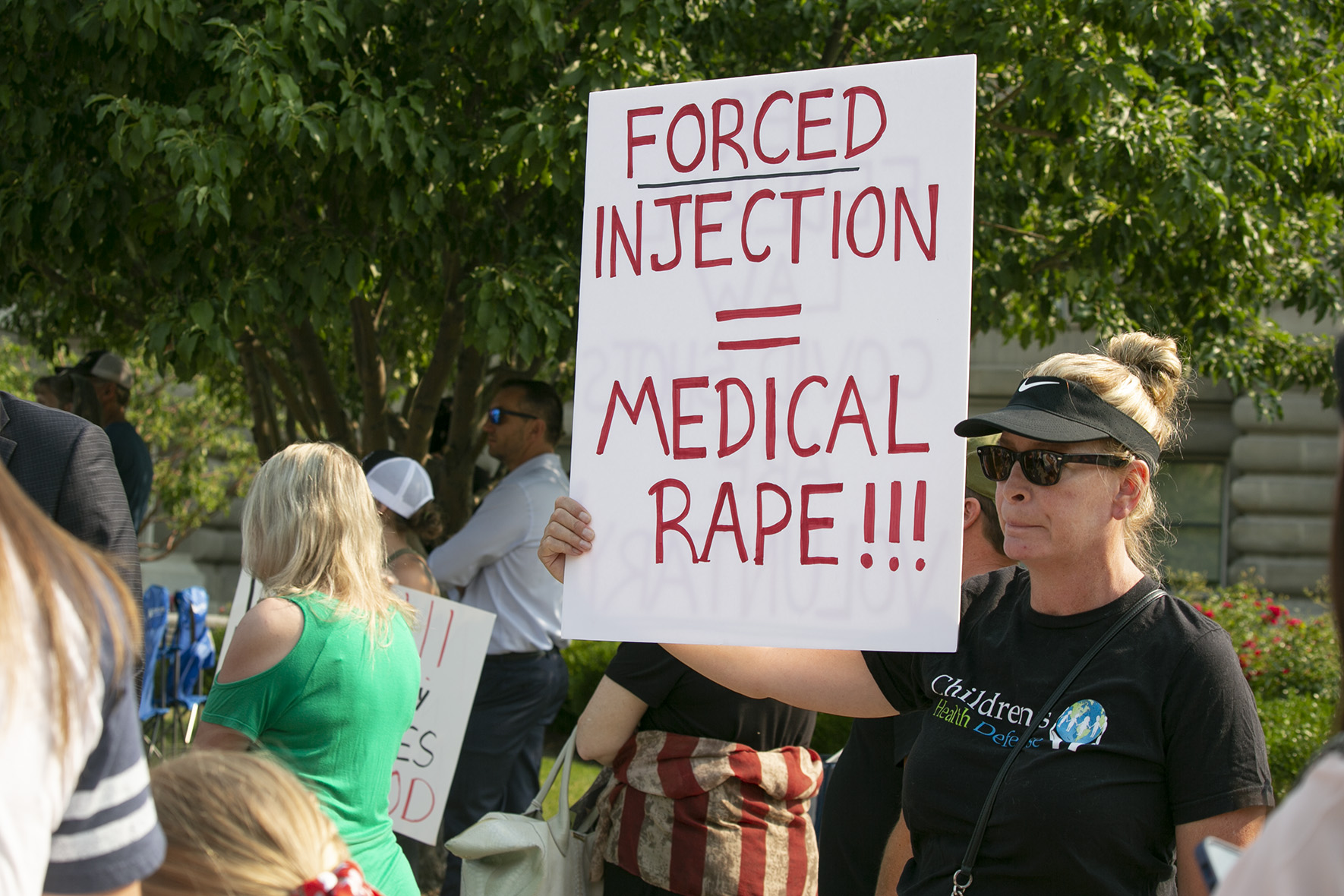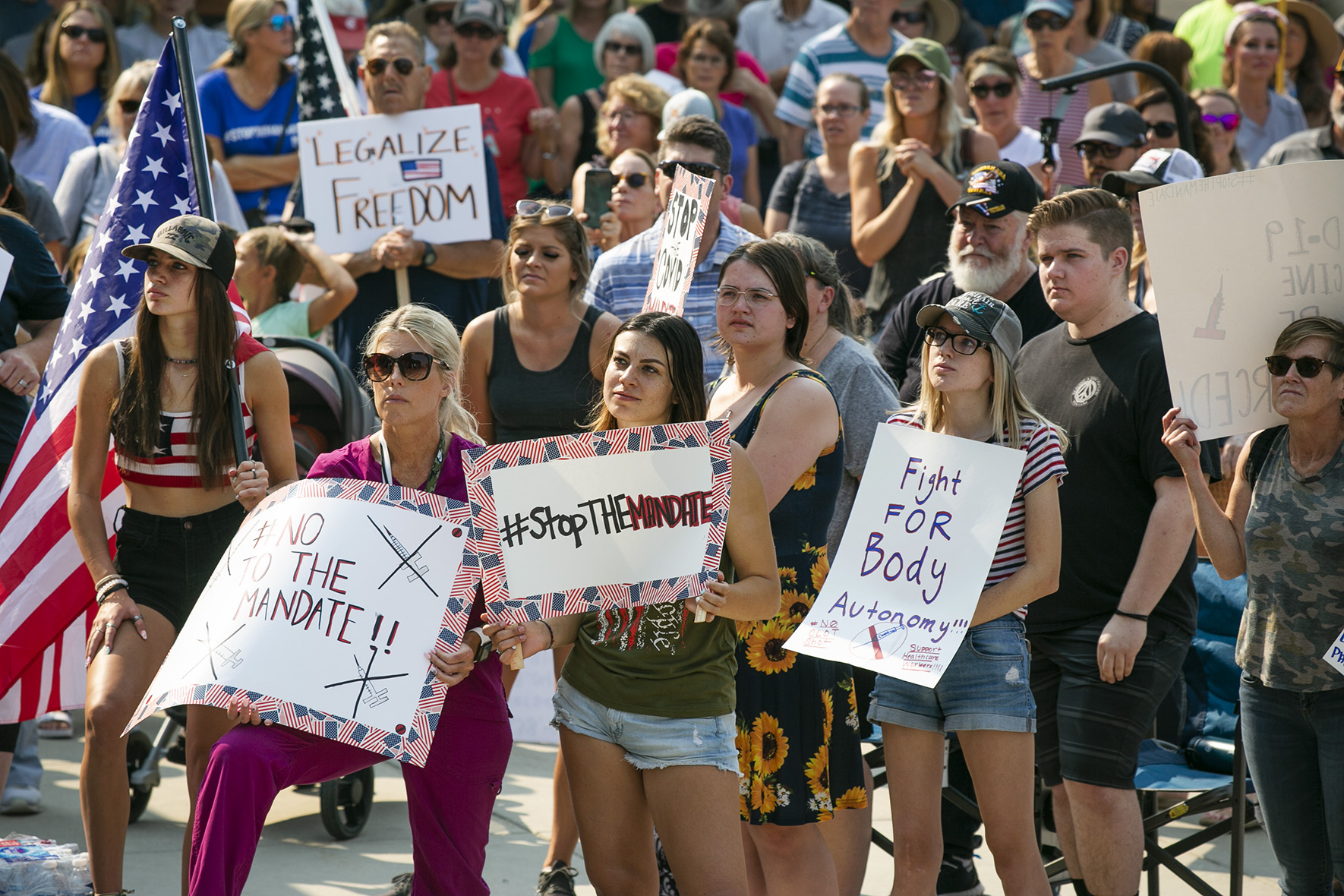
There is nothing stopping school districts and charter schools from requiring their employees to get a COVID-19 vaccine.
Gov. Brad Little’s executive order banning “vaccine passports” says nothing about K-12 schools. That means school trustees and administrators are free to follow the lead from the Treasure Valley’s largest hospitals, which laid out their vaccine requirements last week.
Could it happen? Hard to say.
An employee vaccine mandate might take some of the oxygen away from the summer-long debate over critical race theory and indoctrination — but only because locally elected trustees could face the wrath of constituents and, potentially, some employees. But on the other hand, trustees and administrators could struggle to reopen and stay open, if the more contagious coronavirus delta variant spreads through a school.
What Little’s order says … and doesn’t say
Little’s April 7 executive order applies to any “department, agency, board, commission, or other executive branch entity or official of the state of Idaho.”
That’s important.
That means the order applies to Idaho’s higher education system, since they are state-run schools. While 578 colleges and universities are planning to require student vaccinations this fall, according to the Chronicle for Higher Education, Idaho’s public institutions won’t be among them.
But while school districts and charter schools are state-funded — to the tune of more than $2 billion, for the first time in Idaho’s history — they are not a part of state government. So schools could require staffers, or visitors, to show proof of a vaccination.
But schools couldn’t require eligible K-12 students to get a vaccine.
State law and state administrative rules — separate from Little’s executive order — cover child vaccination guidelines. The COVID-19 vaccine, which isn’t available for children under age 12, isn’t on the state’s list of recommended vaccines. On top of that, parents can easily opt their kids out of any vaccine on the list, just by submitting a written note to the school. Long story short: Public and charter school students aren’t required to get the COVID-19 vaccine.
Vaccines and schools, mandates or not
It’s unclear why Little’s executive order is silent on K-12 public schools and charter schools — or any other local government entity, for that matter. Spokeswoman Marissa Morrison Hyer did not respond to an email from Idaho Education News.
However, Little has made vaccinations a centerpiece of his school reopening strategy. He opened vaccinations to K-12 teachers and staff in January — making them among the first Idahoans who were eligible for a jab, back when vaccine supplies were limited and demand was high.
Six months later, with supplies plentiful and demand eroding, the vaccine remains a key to Little’s thinking on COVID-19 and opening schools. As the fast-moving delta variant becomes the nation’s prevailing coronavirus strain, Little believes his early-vaccination strategy has positioned Idaho schools well for 2021-22, education adviser Greg Wilson said last week.
Research suggests the vaccines are highly effective against all coronavirus strains, including the delta variant. But that hinges on getting shots in arms. There’s no way of knowing how many teachers are vaccinated; the state doesn’t track these rates by profession, Department of Health and Welfare spokeswoman Niki Forbing-Orr said.
Mandate or not, the threat of the new delta variant could nudge hesitant teachers and staffers to get a vaccine they did not receive months ago.
“I would not want to be an unvaccinated teacher,” said Dr. David Pate, the retired St. Luke’s Health Care System CEO who sits on Little’s coronavirus working group.
Powers of persuasion — and legal leverage
The Idaho School Boards Association knows of no districts or charters that have mandated vaccines or have considered the move, policy and government affairs director Quinn Perry said.
In a January email, ISBA urged its members to consider a gentler approach. “It may be that employers will obtain more compliance and ‘buy-in’ by encouraging and making vaccines available and something which employees can opt into,” the ISBA wrote.
But the memo also made clear that employers, including schools, have legal leverage. The federal Americans with Disabilities Act contains language that says a co-worker “shall not pose a direct threat to the health or safety of individuals in the workplace.” Employers are expected to try to accommodate workers who want to opt out of a vaccine on medical or religious grounds; if that’s impossible, the Equal Employment Opportunity Commission says employers can exclude an unvaccinated employee from the workplace.
As the vaccine mandate issue flares up in and around the Idaho Statehouse, much of the debate centers on the rights of employees, but also employers. That’s the tack taken Tuesday by the Idaho Association of Commerce and Industry, the state’s most powerful business lobby.
“The reality is that an employer should not be forced to keep an employee who does not adhere to the standards and requirements of the enterprise,” IACI said in a letter to legislators.

The latest COVID-19 political firestorm
IACI weighed in this week for one basic reason: politics.
Some legislators are agitating to come back to Boise to address the vaccine mandates and the decision from the Treasure Valley’s hospitals. Lt. Gov. Janice McGeachin is urging House Speaker Scott Bedke to reconvene the House — which didn’t actually adjourn in May, but instead called a recess that would allow lawmakers to return to town. During a Statehouse news conference Thursday, she urged lawmakers to revisit several bills on vaccinations, considered but not passed during the 122-day session, and get out ahead of the hospitals’ policies.
“Burying our head in the sand has a long history of failure,” she said. “We have a small window of opportunity — just eight weeks – before these vaccine mandates are scheduled to take effect.”
Bedke has been noncommittal, questioning whether legislators want to tell employers what to do. The Senate, meanwhile, is scheduled to caucus Friday to discuss options, Idaho Public Television’s “Idaho Reports” wrote last week.
Unless the Legislature reconvenes, and votes to ban vaccine mandates, the status quo will remain in place when schools reopen this fall. That means the decision on vaccines would still rest with school trustees or charter school officials.
But it’s hard to imagine a school board rushing into this fray.
Trustees, locally elected volunteer officeholders, have spent the past 15 months under scrutiny for their COVID-19 responses: on face-to-face vs. online learning, on facemask requirements; on safety protocols for athletics and school events. Would these trustees want to jump into one more COVID-19 firestorm, and inject themselves in the Statehouse debate over vaccines?
“I think trustees and administrators are paying attention to that,” Perry said.
Each week, Kevin Richert writes an analysis on education policy and education politics. Look for it every Thursday.
